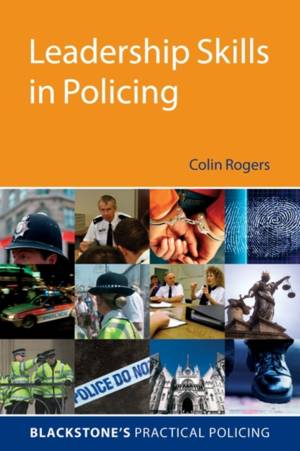
En raison d'une grêve chez bpost, votre commande pourrait être retardée. Vous avez besoin d’un livre rapidement ? Nos magasins vous accueillent à bras ouverts !
- Retrait gratuit dans votre magasin Club
- 7.000.000 titres dans notre catalogue
- Payer en toute sécurité
- Toujours un magasin près de chez vous
En raison de la grêve chez bpost, votre commande pourrait être retardée. Vous avez besoin d’un livre rapidement ? Nos magasins vous accueillent à bras ouverts !
- Retrait gratuit dans votre magasin Club
- 7.000.0000 titres dans notre catalogue
- Payer en toute sécurité
- Toujours un magasin près de chez vous
112,95 €
+ 225 points
Description
This practical guide to developing leadership skills in policing examines the qualities that make up a good leader, providing a variety of examples of good leadership approaches in various policing contexts. Police organizations are increasingly recognizing the role of leadership at every level of the police hierarchy; with police officers involving themselves with partnership work, attending and facilitating public meetings and heading neighborhood policing teams, as well as their more traditional police work. This book aims to enhance leadership skills in policing and ensure officers carry out their duties as effectively as possible. It outlines the theory and concepts of leadership and applies them to police management structures, offering advice on a wide range of issues. These issues include leading teams, motivating others, dealing with disputes, problem-solving, participating in meetings and ethical leadership. All explanations are supported by exercises, examples of both good and bad leadership approaches, flow charts, useful websites and suggested further reading. The first practical guide to tackle leadership aimed at uniformed officers, this title is an essential purchase for anyone within the police service who has responsibility for leading at the front line of the police service. The book forms part of the Blackstone's Practical Policing Series. The series, aimed at junior to middle ranking officers, consists of practical guides containing clear and detailed explanations of the relevant legislation and practice, accompanied by case studies, illustrative diagrams and useful checklists.
Spécifications
Parties prenantes
- Auteur(s) :
- Editeur:
Contenu
- Nombre de pages :
- 298
- Langue:
- Anglais
- Collection :
Caractéristiques
- EAN:
- 9780199539512
- Date de parution :
- 15-10-08
- Format:
- Livre broché
- Format numérique:
- Trade paperback (VS)
- Dimensions :
- 156 mm x 234 mm
- Poids :
- 421 g

Les avis
Nous publions uniquement les avis qui respectent les conditions requises. Consultez nos conditions pour les avis.






